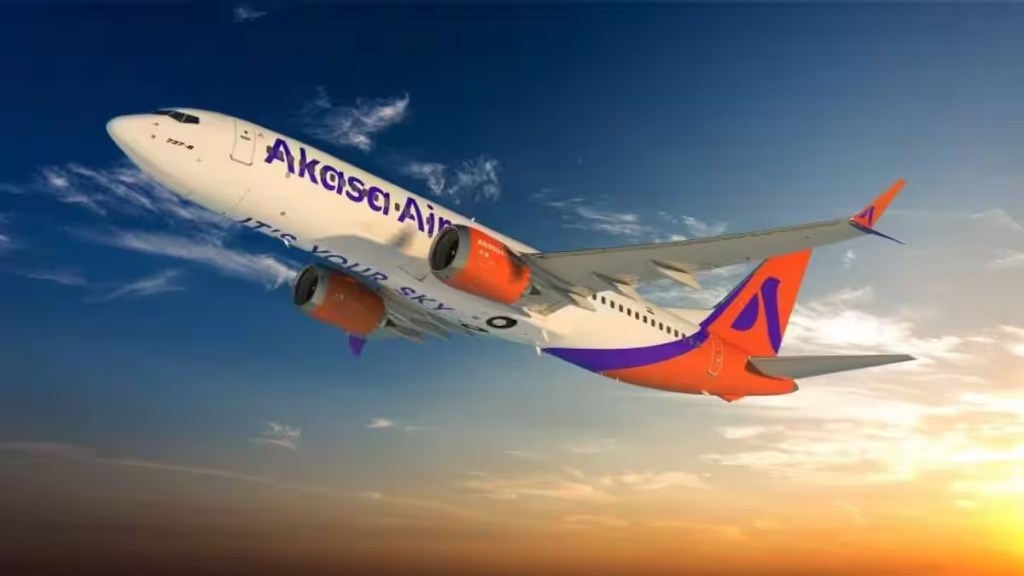Following flight cancellations due to a pilot shortage, Akasa Air tells Financial Express that it presently has a team of over 450 pilots, while as many as 60 more pilots are expected to join the airlines after they fulfill their notice periods with other airlines.
This is a notable increase from the 340 pilots it had in April 2023, representing a 30% growth within the past five months. Additionally, the airline anticipates that it is going to double its current pilot strength within the next 18 months.
Meanwhile, Akasa Air has refuted any rumors regarding route closures attributed to the pilot shortage. The airline clarified that the flight cancellations are considered “temporary limitations” and not indicative of permanent route closures.
“In the last thirty days we have rationalized our network to ensure that we offer our customers the highest levels of operational reliability, as we did for the first 11 months of our operation. Our commitment to be reliable remains sacrosanct – this means that we have chosen to fly less and give up market share in the short term to offer a more reliable network to our customers. Please be assured though, that these are only short-term constraints,” Akasa Air told FE.
How Akasa Air’s pilot crisis unfolded
Akasa Air enjoyed a remarkable inaugural year in the Indian aviation market since it initiated its domestic services on August 7, 2022. In an industry historically known for its challenges for newcomers, this young and budget-friendly airline swiftly captured a 5 percent market share in just 11 months of commencing its operation. As the airline approached its one-year milestone, it expanded its fleet by adding its 20th aircraft, meeting the requirements for pursuing international operations.
At first glance, Akasa Air appeared to be on a positive trajectory under the leadership of its CEO Vinay Dube, an industry veteran with extensive experience in American and Indian airlines. However, the airline found itself scrambling to address a potentially hazardous internal dispute that was emerging within its workforce. This issue struck at the heart of the airline’s operations – cockpit.
As the airline was looking forward to taking off for international skies, a decision made by a small group of pilots changed its fate. A small group of pilots abruptly abandoned their responsibilities and departed without adhering to their contractual notice period. This led to a disruption in Akasa Air’s flight operations from July to September 2023, resulting in last-minute cancellations that left passengers stranded and inconvenienced the traveling public.
As per the employment contract between the airline and its pilots, any pilot resigning is obligated to fulfill a six-month notice period.
Akasa Air’s fight takes off to Delhi, Mumbai HC
Furthermore, the airline is pursuing legal action in both the Delhi and Mumbai High Courts in response to pilots resigning without fulfilling their notice period commitments. Akasa Air’s CEO, Vinay Dube emphasised that these actions not only constituted breaches of their contracts but also violated the civil aviation regulations of the country.
“We recognise that employment is a matter of free choice and we neither want to force any pilot to continue in our employment against their will nor restrain a pilot from leaving us when a pilot so desires. All we expect is for pilots to honour and serve their prescribed contractual notice period, of course, as long as we are adhering to our contractual commitments towards them,” Akasa Air told FE.
On Tuesday, Akasa Air informed the Delhi High Court that it is currently grappling with a “crisis situation” due to the “sudden and unexpected” resignation of over 40 pilots who left the airline without complying with the mandatory notice period.
The airline has collaborated with the Directorate General of Civil Aviation (DGCA) to file a petition in the Delhi High Court seeking the enforcement of an interim order related to the Civil Aviation Requirement (CAR) issued on August 16, 2017. This CAR regulates pilots’ adherence to mandatory contract notice period requirements.
Additionally, Akasa Air has formally announced its legal action in the Bombay High Court to obtain an injunction against a limited number of pilots who resigned abruptly, abandoning their positions without adhering to the required six-month notice period. The airline highlighted that these pilots’ actions had caused significant inconvenience to passengers.

